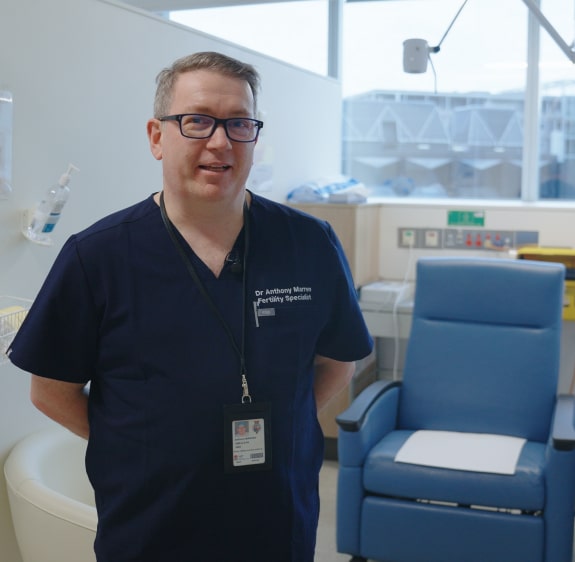

The monthly chance of natural conception is highest when the female is in her 20s. Most people are surprised that even at this age, the chances of achieving a pregnancy is only 20 - 25% per month. This figure will drop to 15 - 25% when the woman is aged 35; 5 - 10% when the woman is aged 40; and < 5% when the woman is aged 45.
This decline in the monthly chance of natural conception is due to a decline in ‘ovarian reserve’ that a woman experiences as she ages. The decline in ovarian reserve reflects both a decline in the numbers of eggs but more importantly a decline in the quality.
Irregular or missed periods may signal ovulatory challenges, which can disrupt the regular release of eggs, a critical factor for conception. These issues may stem from hormonal imbalances, polycystic ovarian syndrome (PCOS), or other underlying conditions. If ovulation concerns are suspected, seeking help can provide clarity and potential treatment options.
Certain medical conditions like polycystic ovary syndrome (PCOS), endometriosis, thyroid disorders, and uterine abnormalities can interfere with fertility. For men, issues like low testosterone or varicocele can play a role. If you have any of these conditions and are on your fertility journey, it’s important to seek support early.

Weight has a significant impact on fertility, as it directly affects hormonal balance and reproductive health. Being underweight can disrupt a woman’s menstrual cycle, leading to irregular or absent ovulation, which makes conception more difficult. For men, being underweight may reduce sperm production and lower testosterone levels, impacting sperm quality and overall fertility.
Similarly, being overweight or obese can also impair fertility by causing hormonal imbalances, such as excess estrogen production in women, which can interfere with ovulation, or reduced testosterone levels in men, which can affect sperm health.
It is estimated that more than half of Australian women and men of reproductive age are overweight or obese and many are unaware that it can reduce fertility and the chance of having a healthy baby.
Some lifestyle behaviours are known to affect fertility, pregnancy health and the health of the baby at birth and in adulthood. Caffeine, alcohol and smoking (vaping) can all affect fertility and reproductive outcomes.
Smoking (vaping) can lower sperm quality and disrupt ovulation, which may increase the risk of miscarriage. Similarly, recreational drugs like marijuana and cocaine can throw off hormonal balance.
Alcohol can also play a role with higher consumption leading to irregular cycles in women and lower testosterone levels in men. Even with caffeine, it’s best to enjoy it in moderation, as too much can be less than ideal for fertility. It can take up to a year for your fertility to recover after substance abuse.

Individuals or couples should seek help at any time if they are concerned or there is something in their medical history that may suggest an issue with fertility such as a prior diagnosis of PCOS or endometriosis.
It is suggested that younger women (< 35-years) try for no more than 12-months prior to seeking assistance. Older women (≥ 35-years) should try for no more than 6-months prior to seeking assistance.
Experiencing multiple miscarriages can be heartbreaking and may indicate underlying issues that need attention. If you’ve had two or more miscarriages, it’s important to speak with a fertility specialist. They can help investigate potential causes, such as hormonal imbalances or structural issues, and support you through the best way forward.
If a semen analysis shows abnormal results, it’s important to consult a fertility specialist. Issues like low sperm count, poor motility (how quickly they can move), or abnormal morphology (the shape and structure of the sperm) might be causing male infertility. Your specialist can help identify potential causes, suggest lifestyle changes, or recommend treatments to improve sperm health.

Infertility is often complex and can feel overwhelming both financially and emotionally.
Fertility specialists are trained to thoroughly investigate and identify the root causes of fertility issues, often starting with tests like blood work, ultrasounds, and semen analysis to gather essential information about both partners. With a clear diagnosis, your specialist can develop a personalised treatment plan tailored to your specific needs.
Fertility specialists offer access to the latest and most effective treatments, including assisted reproductive technologies (ART) like in vitro fertilisation (IVF) and fertility-enhancing medications.
A good specialist will take a holistic approach to your health, also recommending lifestyle adjustments to support a healthy pregnancy. Working with a specialist provides guidance and empowers you with practical steps to move closer to your dream of parenthood, helping to ease the emotional challenges of the fertility journey.

Every hopeful parent should be empowered to understand their fertility. As a specialist in male and female fertility, I have dedicated my life to helping couples who have always dreamt of starting a family. I understand that seeking fertility treatments in Sydney is more than just a medical process; it is a journey that can be both physically and emotionally taxing.
But I'll help you and your partner get through it, exploring all the options open to us with step-by-step support.
The majority of fertility specialists in Australia begin as Obstetricians and Gynaecologists (FRANZCOG). There are a few that are Physician (Endocrinology) trained.
Some of the fertility specialists (FRANZCOG) have chosen to complete a certificate in reproductive endocrinology and infertility (CREI). This requires an additional 3-years of training, set of examinations, and a research project. It also requires that at least 70% of their clinical practice and continuing professional development is in the area of reproductive endocrinology and infertility.
CREI sub-specialists are trained, experienced, and resourced to provide you with the highest level of care for your reproductive health.
For further information: Click here
The monthly chance of natural conception is highest when the female is in her 20s. Most people are surprised that even at this age, the chances of achieving a pregnancy is only 20 - 25% per month. This figure will drop to 15 - 25% when the woman is aged 35; 5 - 10% when the woman is aged 40; and < 5% when the woman is aged 45.
This decline in the monthly chance of natural conception is due to a decline in ‘ovarian reserve’ that a woman experiences as she ages. The decline in ovarian reserve reflects both a decline in the numbers of eggs but more importantly a decline in the quality.
Individuals/ couples should seek help at any time if they are concerned or there is something in their history that may suggest an issue with fertility e.g. a prior diagnosis of PCOS or endometriosis.
Otherwise, it is suggested that younger women (< 35-years) try for no more than 12-months prior to seeking assistance. Older women (≥ 35-years) should try for no more than 6-months prior to seeking assistance.
It is suggested that younger women (< 35-years) try for no more than 12-months prior to seeking assistance. Older women (≥ 35-years) should try for no more than 6-months prior to seeking assistance.
Recurrent Pregnancy Loss (RPL) is when a woman experiences two or more pregnancy losses before 20 weeks of pregnancy. It's relatively uncommon, affecting about 5% of women/ couples. After two miscarriages, it is recommended that women seek medical advice as some causes of RPL can be treated.